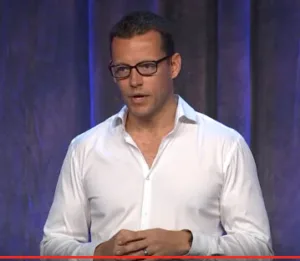Dan Eisenhardt is from Recon Instruments, which is an A/R pioneer which was acquired by Intel and he gave one of the numerous keynotes at the event. He started by saying that by 2031, 16% of cars will be self-driving and 500 billion ‘things’ will be connected to the internet. By then, smart glasses will look like ‘regular’ glasses. Leaving home without them will be like leaving home today without your smartphone.
There are a lot of sceptics around, but that is often the case with new technology. That doesn’t mean the technology won’t succeed. Eisenhardt asked how many wore a wrist watch? 100 years ago, wrist watches were seen as jewelery for women and ‘cissy’ devices – real men were supposed to use pocket watches. In 1917, the US found itself at war in Europe, but in war, a pocket watch is inconvenient, so ‘trench watches’ were developed and, eventually, trench watches became wrist watches. By the 1940s, US presidents were wearing wrist watches because they had been ‘worn by heroes’.
Eisenhardt believes that the same will apply to smart eyewear in the future. There will be no more ‘glassholes’. By 2031, anything that can exploit data will have an internet connection and we could be overwhelmed by data. Will the devices to look at that data be smartphones? or smartwatches?
By then, glasses will know how many calories there are in a meal, or what price a product is. You will know if your boss is happy to be disturbed. In a notebook, the data is locked in a rectangle – it’s an active process and you have to look away from the real world to check it. That won’t be acceptable in the future.
Everything will be ‘curated’ for you in an intelligent way. That will mean the end of the smartphone as we know it. Eisenhardt believes this will also kill the sale of screens as everyone will have their own (I’m more sceptical – Man. Ed.)
Reality is, to some extent, an illusion. Eisenhardt said that the picture of reality really only exists in our brains. We all take a huge leap of faith each day by assuming that the world is constant and we all share a huge frame of reference. That’s not unreasonable today, but by 2031, there will be too much data to process and there will no way to know that the person you’re with has the same data that you have. Their experience of reality will be different from yours. (I’m not sure you have to wait until 2031 for that, I think the same applies now – Man. Ed.)
That will be a challenge for the technology industry – you can’t look just from a technology point of view. To avoid problems, companies will have to ask themselves really good questions about the human experience. Eisenhardt finished by saying that he could see the future, “and it’s a pretty far out place”.

